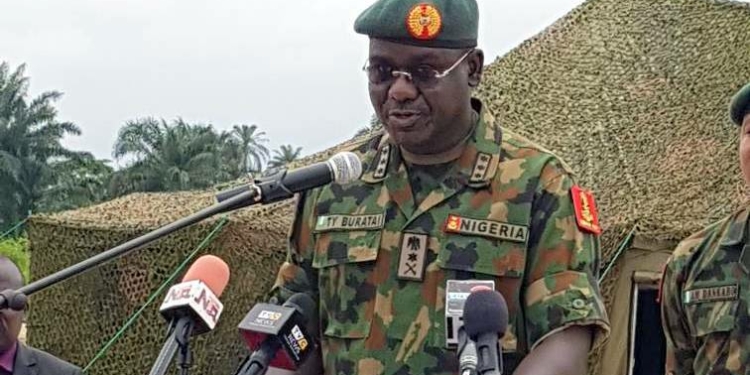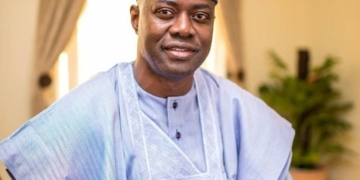By Sunday Ochai
I am charmed by the courage, mien and resilience of the Chief of Army Staff (COAS) and leader of Nigeria’s counter-insurgency operations, Lt. Gen. Tukur Yusufu Buratai. The burden of leadership is quite hefty.
Some Nigerians appear to be very angry at the b murder of some soldiers at Metele, in Guzamala LGA of Northern Borno state by Boko Haram terrorists. But we must also know, there is no commander of an Army which delights in losing his troops to enemy forces. It angers him to infinitum.
I painstakingly scanned commentaries and lamentations. I even weighed the number of troops killed and the rebellious voices of dissension. I inevitably discovered, there is every reason to sympathize with the bereaved families, fellow compatriots and my country, Nigeria. We share in the collective pains and agony.
However, what I painfully realized in the expressed angsts was more of a citizenry, which has lost all sense of patriotism, in the fury of anger and agonies. In mourning moods, we uncritically only looked at today and ignored yesterday and sacrificed the future. This too, is understandable.
In the gloom, we have lost our communality, sense of unity, understanding and the resilience over sorrow, we desperately need now to repress our common enemies.
We have always known, united we stand, but divided, it’s a definite fall before the shadows and swords of enemies. It means destruction awaits us. So, I rummaged my heart in attempts to engage my fellow countrymen and women on how best to placate ourselves amid the national tragedy. I am persuaded to prevail on ourselves to look at issues from different perspectives in times like this.
And luckily, I stumbled on the soothing words of the COAS, Gen. Buratai himself. He echoed an appeal to a bereaved nation in the aftermath of the Metele Boko Haram Terrorists attacks. I loved it and felt, it should be the starting point of my interface with Nigerians on this matter.
A moody COAS crooned; “ It’s bad enough to have casualties in both peace and war. It’s even very bad to have casualties in war, though inevitable. What is required is citizens’ understanding and support. Soldiers do not cause war.”
Continuing, Gen. Buratai said; “War is called politics by other means. The Soldier is an instrument of the State. A symbol of national power and sovereignty. Understand the profession of soldiering. The Soldier serves with all of his; the Soldier gives all of his.”
The Army Chief’s counsel was touchy and emotive for listeners’ on both sides of the divide- the nation and the people. I believe we can draw a lot of inspirations or lessons as a people and a nation from the guidance of the leader of the counter-insurgency operations in Nigeria.
I am quite sure, if Gen. Buratai were the fastidious leader, who are lurking everywhere in this clime, some of the comments on the Metele tragedy would have provoked his ire. And it would also have been understandable because Buratai and his troops have given their best in the past three years to decimate and defeat Boko Haram insurgents.
Much of the respite we enjoy now stems from this commitment. And to think that sometimes, Gen. Buratai laces his boots and hops into the trenches with his troops, only to be dressed down and scorned by the same people they have devoted their entire lives to serve is really disheartening.
But he remained calm and calculated, measuring the pains of the nation over his personal feelings of appreciation or harsh chastisements. He was sober, and never peeved by the obviously extreme reactions.
I am on the same page with Gen. Buratai absolutely. What the Nigerian troops and the military leadership battling insurgency in the country needs are understanding and support from the citizenry. It is consideration and encouragement.
But outright vilification is clearly out of the path, especially as downfalls are part of all human adventures; but resilience is the mark of valour or success. Togetherness, when hearts are broken is antidote to surmounting the most difficult of challenges.
Let me take you on a short experience, using the American example. I am sure most of us know American troops have been in the Middle East, particularly, in Afghanistan, Pakistan, Iraq and Iran since 2001, after the 9/11 terrorists attacks the World Trade Center and the Pentagon House. No number of human casualties in that single terror attack has ever been recorded anywhere in the world.
An enraged America moved to the domain of the terrorists since 2001 and has been fighting to exterminate terrorism roots in that part of the world. America has killed leader of Al Qaeda, Osama Bin Laden, who masterminded the attacks. But Al Qaeda still smolders and has developed new sects in the region, including the Talibans.
America has lost tens of hundreds of troops battling terrorists under its successive Presidents. Also, America has spent $900 billion on the anti-terrorism combats in Afghanistan already.
Yet, American citizens or its parliament which approves the capital votes have never shirked in support to their troops. And it’s very clear to all of them that the anti-terrorism campaigns in the Middle East would not earn them victory anytime soon.
But Americans have never balked. I came across a detailed report appraising the American terror war in the Middle East and I was shocked at the revelations. The report published, September 4, 2018, by “The Nation,” an American online news portal and authored by Nick Turse is captioned, “Is the US Military Winning the War on Terror? Sure.”
Excerpts from this report serves the severity of the problem in these words;
“ America’s victory there came with lightning speed. The next year, President George W. Bush announced that the group had been “defeated.” In 2004, the commander-in-chief reported that the Taliban was “no longer in existence.” Yet, somehow, they were. By 2011, Gen. David Petraeus, then commander of US forces in Afghanistan, claimed that his troops had “reversed the momentum of the Taliban.” Two years later, then-commander Gen. Joseph Dunford spoke of “the inevitability of our success” there.”
But in June 2018, Americans again expressed their resolve to support their troops in Afghanistan through the parliament. The report says in part;
“In June, the 17th American nominated to take command of the war, Lt.Gen.Scott Miller, appeared before the Senate Armed Services Committee where Elizabeth Warren (D-MA) grilled him on what he would do differently in order to bring the conflict to a conclusion. “I cannot guarantee you a timeline or an end date,” was Miller’s confident reply. Did the senators then send him packing? Hardly. He was, in fact, easily confirmed and starts work this month.”
That’s the resoluteness of a nation and a people facing a common enemy. Meanwhile, the 2019 budget request to Congress for further funding of American operations in Afghanistan was estimated at $46.3 billion, which will surely get Congress approval.
The spirit of any American is neither dampened because huge resources are expended and the war on terror is not completely defeated nor America troops have died in the process. It comes about because of understanding. That is the message Gen. Buratai is preaching in his short exposition. And I think it is worthy of consideration.
Our country Nigeria shall be greater and triumph over enemies in the war on terror, if we eschew bitterness over unforeseeable incidents like the unfortunate attack on a Military base in Metele. If we lampoon our Army out of relevance or reckoning, are there really alternatives? Certainly no! We must encourage and support them to fight on, it a sacred obligation we must discharge.






Discussion about this post